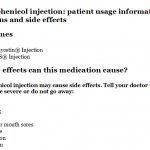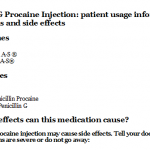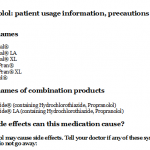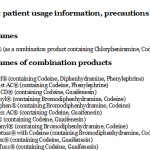
Pneumovax 23 (pneumococcal vaccine polyvalent): patient information, prescribing information, ingredients, manufacturer, adverse reactions and side effects
Tuesday, April 11, 2017 by Gregory Van Dyke
http://www.naturalnewsreference.com/2017-04-11-pneumovax-23-pneumococcal-vaccine-polyvalent-patient-information-prescribing-information-ingredients-manufacturer-adverse-reactions-and-side-effects.html
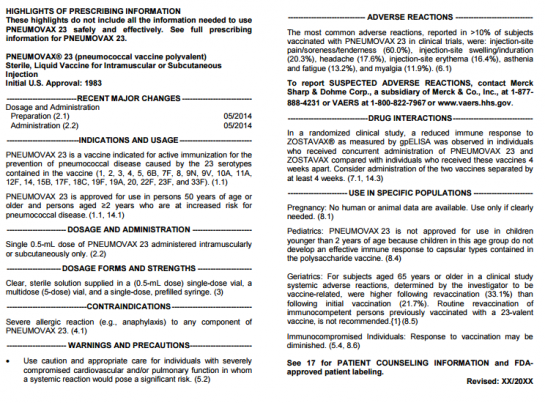
HIGHLIGHTS OF PRESCRIBING INFORMATION
These highlights do not include all the information needed to use PNEUMOVAX 23 safely and effectively. See full prescribing information for PNEUMOVAX 23.
See full insert sheet at this link at the Natural News Reference website.
PNEUMOVAX® 23 (pneumococcal vaccine polyvalent)
Sterile, Liquid Vaccine for Intramuscular or Subcutaneous Injection
Initial U.S. Approval: 1983
INGREDIENTS AND EXCIPIENTS
PNEUMOVAX 23 (Pneumococcal Vaccine Polyvalent) is a sterile, liquid vaccine consisting of a mixture of purified capsular polysaccharides from Streptococcus pneumoniae types (1, 2, 3, 4, 5, 6B, 7F, 8, 9N, 9V, 10A, 11A, 12F, 14, 15B, 17F, 18C, 19F, 19A, 20, 22F, 23F, and 33F).
PNEUMOVAX 23 is a clear, colorless solution. Each 0.5-mL dose of vaccine contains 25 micrograms of each polysaccharide type in isotonic saline solution containing 0.25% phenol as a preservative. The vaccine is used directly as supplied. No dilution or reconstitution is necessary.
The vial stoppers, syringe plunger stopper and syringe tip cap are not made with natural rubber latex.
INDICATIONS AND USAGE
PNEUMOVAX 23 is a vaccine indicated for active immunization for the prevention of pneumococcal disease caused by the 23 serotypes contained in the vaccine (1, 2, 3, 4, 5, 6B, 7F, 8, 9N, 9V, 10A, 11A, 12F, 14, 15B, 17F, 18C, 19F, 19A, 20, 22F, 23F, and 33F). (1.1)
PNEUMOVAX 23 is approved for use in persons 50 years of age or older and persons aged ≥2 years who are at increased risk for pneumococcal disease. (1.1, 14.1)
DOSAGE AND ADMINISTRATION
Single 0.5-mL dose of PNEUMOVAX 23 administered intramuscularly or subcutaneously only. (2.2)
DOSAGE FORMS AND STRENGTHS
Clear, sterile solution supplied in a (0.5-mL dose) single-dose vial, a multidose (5-dose) vial, and a single-dose, prefilled syringe. (3)
CONTRAINDICATIONS
Severe allergic reaction (e.g., anaphylaxis) to any component of PNEUMOVAX 23. (4.1)
WARNINGS AND PRECAUTIONS
Use caution and appropriate care for individuals with severely compromised cardiovascular and/or pulmonary function in whom a systemic reaction would pose a significant risk. (5.2)
ADVERSE REACTIONS
The most common adverse reactions, reported in >10% of subjects vaccinated with PNEUMOVAX 23 in clinical trials, were: injection-site pain/soreness/tenderness (60.0%), injection-site swelling/induration (20.3%), headache (17.6%), injection-site erythema (16.4%), asthenia and fatigue (13.2%), and myalgia (11.9%). (6.1)
To report SUSPECTED ADVERSE REACTIONS, contact Merck Sharp & Dohme Corp., a subsidiary of Merck & Co., Inc., at 1-877- 888-4231 or VAERS at 1-800-822-7967 or www.vaers.hhs.gov.
DRUG INTERACTIONS
In a randomized clinical study, a reduced immune response to ZOSTAVAX® as measured by gpELISA was observed in individuals who received concurrent administration of PNEUMOVAX 23 and ZOSTAVAX compared with individuals who received these vaccines 4 weeks apart. Consider administration of the two vaccines separated by at least 4 weeks. (7.1, 14.3)
USE IN SPECIFIC POPULATIONS
Pregnancy
Pregnancy Category C: Animal reproduction studies have not been conducted with PNEUMOVAX 23. It is also not known whether PNEUMOVAX 23 can cause fetal harm when administered to a pregnant woman or can affect reproduction capacity. PNEUMOVAX 23 should be given to a pregnant woman only if clearly needed.
Nursing Mothers
It is not known whether this drug is excreted in human milk. Because many drugs are excreted in human milk, caution should be exercised when PNEUMOVAX 23 is administered to a nursing woman.
Pediatric Use
PNEUMOVAX 23 is not approved for use in children less than 2 years of age. Children in this age group do not develop an effective immune response to the capsular types contained in this polysaccharide vaccine.
The ACIP has recommendations for use of PNEUMOVAX 23 in children 2 years of age or older, who have previously received pneumococcal vaccines, and who are at increased risk for pneumococcal disease.{2}
Geriatric Use
In one clinical trial of PNEUMOVAX 23, conducted post-licensure, a total of 629 subjects who were aged ≥65 years and 201 subjects who were aged ≥75 years were enrolled.
In this trial, the safety of PNEUMOVAX 23 in adults 65 years of age and older (N=629) was compared to the safety of PNEUMOVAX 23 in adults 50 to 64 years of age (N=379). The subjects in this study had underlying chronic illness but were in stable condition; at least 1 medical condition at enrollment was reported by 86.3% of subjects who were 50 to 64 years old, and by 96.7% of subjects who were 65 to 91 years old. The rate of vaccine-related systemic adverse experiences was higher following revaccination (33.1%) than following primary vaccination (21.7%) in subjects ≥65 years of age, and was similar following revaccination (37.5%) and primary vaccination (35.5%) in subjects 50 to 64 years of age.
Since elderly individuals may not tolerate medical interventions as well as younger individuals, a higher frequency and/or a greater severity of reactions in some older individuals cannot be ruled out.
Post-marketing reports have been received in which some elderly individuals had severe adverse experiences and a complicated clinical course following vaccination. Some individuals with underlying medical conditions of varying severity experienced local reactions and fever associated with clinical deterioration requiring hospital care.
Immunocompromised Individuals
Persons who are immunocompromised, including persons receiving immunosuppressive therapy, may have a diminished immune response to PNEUMOVAX 23.
Revised: XX/20XX
https://www.fda.gov/downloads/BiologicsBloodVaccines/Vaccines/ApprovedProducts/UCM257088.pdf
http://naturalnewsreference.com/vaccine-insert-sheets/Pneumovax-23.pdf
Tagged Under: Tags: dosage, ingredients, insert sheet, Pneumovax 23, side effects, usage, warnings

